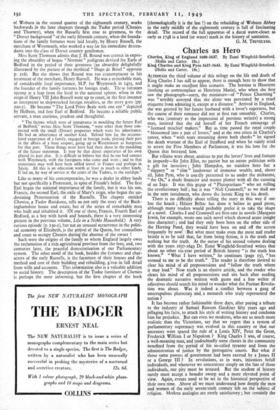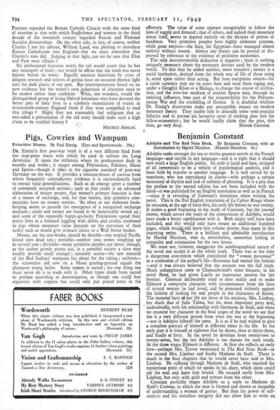Charles - as Hero Charles, King of England 1600-1637. By Esme
Wingfield-Stratford. (Hollis and Carter. 185.) ALTHOUGH the third' volume of this trilogy on the life and death of King Charles I has still to appear, there is enough here to show that it might make an excellent film scenario. The heroine is Henriette (nothing so commonplace as Henrietta Maria), who when she first saw the photograph—sorry, the miniature—of -" Prince Charming" was "terribly annoyed that she alone- was prevented by a cruel etiquette from admiring it, except at a distance." Arrived in England, she was greeted by her future husband with a lover's eagerness, but the course of their romance did not at first run smoothly. Charles, who Was (contrary to the impression of- previous writers) a strong man, insisted that she rid herself of her French entourage of "licensed mischief makers." But as time passed the royal couple "blossomed into a pair of lovers," and at the two crises in Charles's career, when "with tears streaming down both cheeks" he signed the death warrant of the Earl of Strafford and when he vainly tried to arrest the Five Members of Parliament, it was his love for the Queen that betrayed him.
But villains were about, anxious to put the lovers' lives and fortune in jeopardy—Sir John Eliot, no patriot but an astute politician with a gift for invective ; John Hampden, no stainless hero but a " slippery " or " slim " landowner of immense wealth; and, above all, John Pym, who is usually presented to us under the nickname, "the Ox," a shady financier and master plotter with all the cunning ' of an Iago. It was this group of " Plutopuritans " who set rolling the revolutionary ball ; but it was " Noll Cromwell," as we shall see in the next instalment, who drove the heroic King to his death.
There is no difficulty about telling the story in this way if one has the knack ; Hilaire Belloc has done it before in good prose, although many readers would probably prefer it to take the shape of a novel. Charles.' and Cromwell are first-rate in novels (Margaret Irwin, for example wrote one such novel which showed acute insight into character) ; and had they only been born on the other side of the Herring Ponds they would have been on and off the screen frequently by now But what mutt -make even the most naïf reader bristle is to be told that, far from being fiction, it is the truth and nothing but the truth. At the outset of his second volume dealing with the years 1637-1643 Dr. Esine Wingfield-Stratford writes that about no other six-year period of British history "is the truth less known." "What I have written," he continues (page 15), "has seemed to me to be the truth." The reader is therefore invited to clear his mind of all prepossessions and "follow the truth where it may lead." Now truth is an elusive article, and the reader who clears his mind of all prepossessions and sits back after reading the dramatic narrative written with gusto and a fine welter of adjectives should search his mind to wonder what the Puritan Revolu- tion was about. Was it indeed a; conflict between a gang of unscrupulous plutocrat, and, a monarch who truly represented the nation ?
It has become rather fashionable these days, after paying a tribute to the industry of Samuel Rawson Gardiner fifty years ago and pillaging his facts, to attach his style of writing history and condemn hioa for prejudice. But can even we moderns, who are so much more realistic than the Victorians, say that we regret that a system of parliamentary supremacy was evolved in this country or that our ancestors were spared the rule of a Louis XIV, Peter the Great, Frederick William I or Napoleon ? King Charles I was, of course, a well-meaning man, and undoubtedly some classes in the community benefited from the period of his so-called tyranny and from the administration of justice by the prerogative courts. But what if those same powers of government had been exerted by a James II or a George III ? In revolutions, as in wars; injustices befall individuals, and whenever we concentrate simply on the fate of those individuals, our pity must be aroused. But the student of history surely must accept a broader sweep and a more elevated point of view. Again, events need to be set in the historical perspective of their own time. Above all we must understand how deeply the men and women of the early seventeenth century felt on the subject of religion. Modem analogies -are rarely satisfactory ; but certainly the
Puritans regarded the Romah Catholic Church with the same kind of aversion as that with which Englishmen and women in the third decade of the twentieth century 'regarded Fascist and National Socialist dictatorships. On the other side, in fact, of course, neither Charles I nor his adviser, William Laud, was plotting to introduce Roman Catholicism into England—but we must remember that Charles's sons did. Judging in that light, can we be sure that Eliot and Pym were villains ?
No professional historian worth his salt would assert that he has any monopoly of truth ; nor would he affirm that the truth was never known before he wrote. Equally amateur historians by years of diligent research and writers of genius have on occasion thrown light into the dark places of our past. But reinterpretations based on no new evidence but the writer's own judgement of character need to be modest rather than confident. What, one wonders, would the distinguished group of living Oxford-historians who have devoted the better part of their lives to a scholarly examination of events in seventeenth-century England think if they were compelled to read this trilogy ? Might they not reasonably feel indignant that so one-sided a presentation of the old story should make such a high claim to be truthful history ?
`N MAURICE ASHLEY.







































 Previous page
Previous page